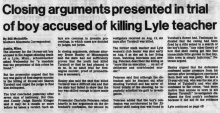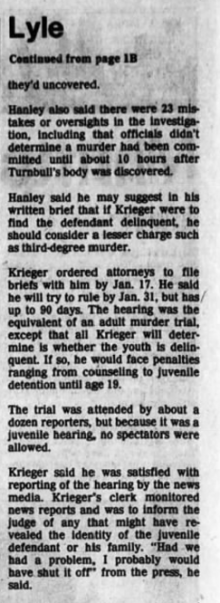Closing arguments presented in trial of boy accused of killing Lyle teacher
Closing arguments presented in trial of boy accused of killing Lyle teacher
By Bill McAuliffe
Southern Minnesota Correspondent
Austin, Minn.
The attorney for the 14-year-old boy accused in the August shooting death of a Lyle, Minn., schoolteacher asked Wednesday for "a mandate that the perpetrator of this crime be found."
But the prosecutor argued that the boy was guilty of first-degree murder in the killing of 33-year-old Sharon Turnbull and urged the judge to find him delinquent.
The trial concluded yesterday after seven days of testimony. But Olmsted County Judge Harold Krieger said it may be a month or more before he issues a verdict. Such delays are common in juvenile proceedings, in which cases are decided by judges, not juries.
In closing arguments, defense attorney Bruce Hanley of Minneapolis said the state had not sufficiently proven that the youth had killed Turnbull or that he had planned to do so. In an adult trial for first-degree murder, proof of premeditation is necessary.
Hanley also said the shot that killed Turnbull was a difficult one and that the state had failed to show that the boy was skilled enough to have made it.
Prosecutor Charlotte Peterson relied heavily in her arguments on the defendant's confession, the second investigators received on Aug. 12, six days after Turnbull was killed.
The former math teacher and Lyle women's club leader was shot early on Aug. 6 as she sat in her living room, watching television and sewing. Peterson described the killing as "more like an execution... an act of deliberate and cold-blooded murder."
Peterson said that although the defendant said he blacked out after shooting Turnbull and has never offered details of the shooting, he repeatedly admitted his guilt to investigators.
Peterson added that the boy's confession was corroborated by the .22-caliber shell casing that was found in Turnbull's flower bed. Testimony indicated that the casing had been fired by a rifle seized in a search of the boy's home. "Any other theory of how that shell casing got into that immaculate little garden in that tiny, little town is simply ludicrous," Peterson argued.
Hanley argued that the defendant confessed under pressure from his parents after investigators convinced them their son was guilty. He said a 15-year-old boy, who was the son of a friend of Turnbull's and who also confessed to the crime, "had more motive than anyone in town to kill Sharon Turnbull." Investigators dismissed the first youth's confession because it did not fit the evidence
Lyle continued on page 4B
Lyle Continued from page 1B
they'd uncovered.
Hanley also said there were 23 mistakes or oversights in the investigation, including that officials didn't determine a murder had been committed until about 10 hours after Turnbull's body was discovered.
Hanley said he may suggest in his written brief that if Krieger were to find the defendant delinquent, he should consider a lesser charge such as third-degree murder.
Krieger ordered attorneys to file briefs with him by Jan. 17. He said he will try to rule by Jan. 31, but has up to 90 days. The hearing was the equivalent of an adult murder trial, except that all Krueger will determine is whether the youth is delinquent. If so, he would face penalties ranging from counseling to juvenile detention until age 19.
The trial was attended by about a dozen reporters, but because it was a juvenile hearing, no spectators were allowed.
Krieger said he was satisfied with reporting of the hearing by the news media. Krieger's clerk monitored news reports and was to inform the judge of any that might have revealed the identity of the juvenile defendant or his family. "Had we had a problem, I probably would have shut if off" from the press, he said.



